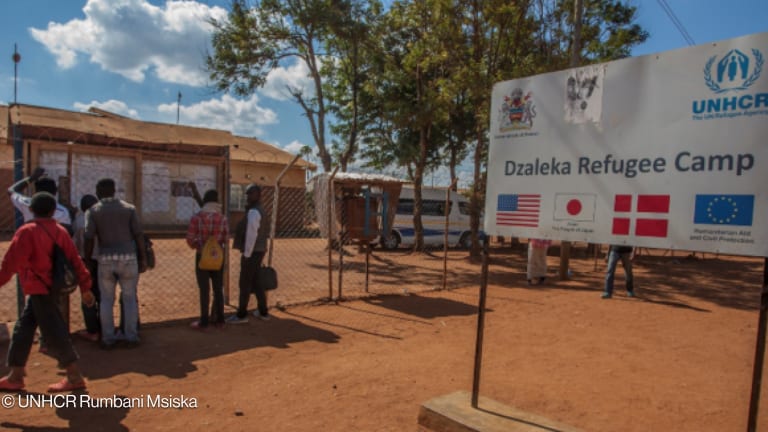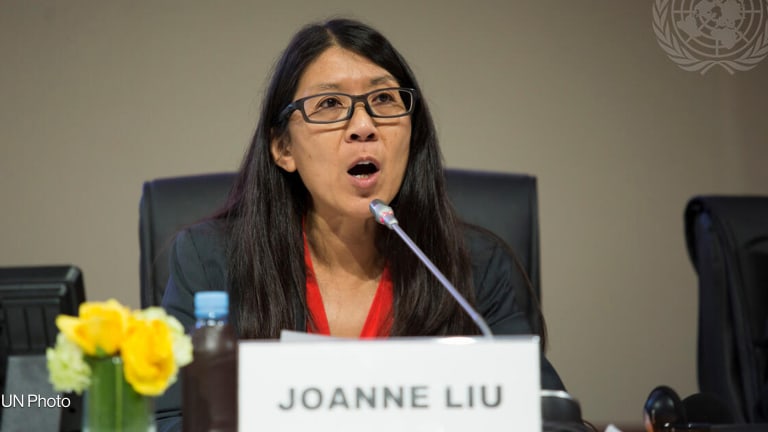
WASHINGTON — Politics in Washington are restricting when and how forcefully UNHCR, the United Nations agency tasked with enforcing the 1951 Refugee Convention and its protocol, speaks out about a Trump administration policy that has tightened rules on asylum seekers and implemented a dramatic reduction in refugee and migrants admissions to the United States, advocates have said.
“I’m not expecting UNHCR to act like an advocacy NGO. But between being an advocacy NGO and saying absolutely nothing, which has been the pattern, there’s clearly a middle ground.”
— Joel Charny, executive director, Norwegian Refugee Council USAThe latest criticism comes following a perceived delay in the release of a public statement by the U.N. Refugee Agency in response to the administration’s new asylum policy. The statement was issued more than 12 hours after other organizations had spoken out strongly on the new U.S. policy and didn’t assuage fears about what refugee and migrants’ advocates say has become an alarming trend of muted UNHCR responses.
President Donald Trump, who focused on immigration policy during his presidential campaign and made it a central issue in last week’s midterm elections, announced that the U.S. would no longer allow people to claim asylum unless they presented themselves at official ports of entry.
The move was in apparent reaction to a group of refugees and migrants largely from Honduras who were moving through Mexico to seek asylum at the U.S. border. Trump previewed the changes to U.S. asylum law at a press conference just before the election, sparking questions over the legality of such a move.
While the official presidential proclamation on asylum policy change wasn’t issued until the morning of Nov. 9, the White House held a background call with reporters the day before and media outlets published reports detailing the new policy.
Amnesty International and Human Rights Watch both released statements the evening of Nov. 8, decrying the attack on people legitimately fleeing persecution at home.
At a regular media briefing in Geneva, Switzerland, on Nov. 9, UNHCR spokesman Babar Baloch initially refused comment, saying the policy was being reviewed.
Joel Charny, executive director of Norwegian Refugee Council USA, questioned that response.
“Seriously? That’s what your response is? Given the importance of the issue and given that there was a heads up that this was coming out, I think they probably could have been a little bit quicker,” Charny said.
“I’m not expecting UNHCR to act like an advocacy NGO. But between being an advocacy NGO and saying absolutely nothing, which has been the pattern, there’s clearly a middle ground.”
It wasn’t until after noon Eastern Time on Nov. 9 that UNHCR emailed out its statement.
“UNHCR expects all countries, including the United States, to make sure any person in need of refugee protection and humanitarian assistance is able to receive both promptly and without obstruction in accordance with the 1967 refugee Protocol to which the United States is a party,” the statement said. “UNHCR stands ready at all times to support the United States and all governments and civil society partners working to guarantee that any person fleeing life-threatening violence or persecution is able to reach safe ground and is able to have their claim reviewed.”
Charny said that while he found the statement’s language to be appropriately strong in condemning U.S. action, the delay issuing it was an example of the agency’s “outrageous inability to challenge the Trump administration in areas that are basically UNHCR’s bread and butter.”
In response to the criticism, UNHCR senior public information officer Christopher Boian said: "Our attention is focused first and foremost on serving the people around the world who need our help. In that respect, UNHCR engages intensively with the United States in private. When it is useful also to comment publicly, we do so clearly and promptly in any country, the United States included."
Part of the problem, said James Hathaway, director of the program in refugee and asylum law at the University of Michigan Law School, is that the Refugee Convention UNHCR enforces is the only U.N. convention that doesn’t have an independent supervisory authority. He explained that the convention isn’t clear that the agency itself has the supervisory capacity to ensure compliance by signatory countries.
“The difficulty for [UNHCR] is that more than 90 percent of their budget every year comes from voluntary funds. Virtually none of their budget is guaranteed and they come to the same 20 or so rich countries, including the U.S.,” Hathaway said.
“They either should do the job and take the risk, or they should admit that they can’t do the job and, as I and others have proposed, we should set up an independent supervisory body for this treaty, just like what we have for every other human rights treaty.”
UNHCR doesn’t get money from the U.N. General Assembly — member countries pledge directly to the refugee agency to fund its operations. Hathway said that as UNHCR’s duties have shifted over the years, it has become more dependent on funds to conduct humanitarian operations around the world which it cannot afford to have suspended by an angry member country.
“The real question is, can UNHCR look itself in the mirror and say ‘If we are going to be [a] tents and blankets agency primarily, will we support the establishment of an arms-length entity that can do the harder job of criticizing the states?’ I think that’s what we need right now,” said Hathaway, who was part of an unsuccessful effort several years ago to establish an independent body to monitor compliance with the Refugee Convention.
Former employees say it’s important to remember UNHCR is a diplomatic agency. Larry Yungk, a former senior resettlement officer with UNHCR in Washington, D.C., said the agency must think about what it is going to say publicly as well as what action it is willing to take.
“As a former employee, I can say that we were often frustrated that we didn’t get to go out and say more. But at the same time, I do think that when we did say something, it had more impact because of that,” Yungk said. “There is a lot of discretion.”
Although a self-imposed muzzling of the agency may frustrate NGOs and advocacy organizations who want to see UNHCR as the world’s moral authority on refugee and migrant issues, a more diplomatic approach will better serve its interests, suggested Jeremy Konyndyk, who has worked on refugee issues for NGOs and the U.S. government. He said other countries are watching what UNHCR says about the U.S. and how Washington reacts.
“Ultimately, I think UNHCR’s tactic here is to try to not alienate the U.S. government and I think that’s probably wise. Presenting themselves as a resource that can try to constructively shape U.S. policy is both the defensible approach by UNHCR, but also one that’s basically necessitated by the fact that they are a member state-based organization,” Konyndyk said.
“UNHCR here is in effect speaking to one of their board members in all these situations. These member states make up their governing board. You don’t tell your board member to go to hell.”








